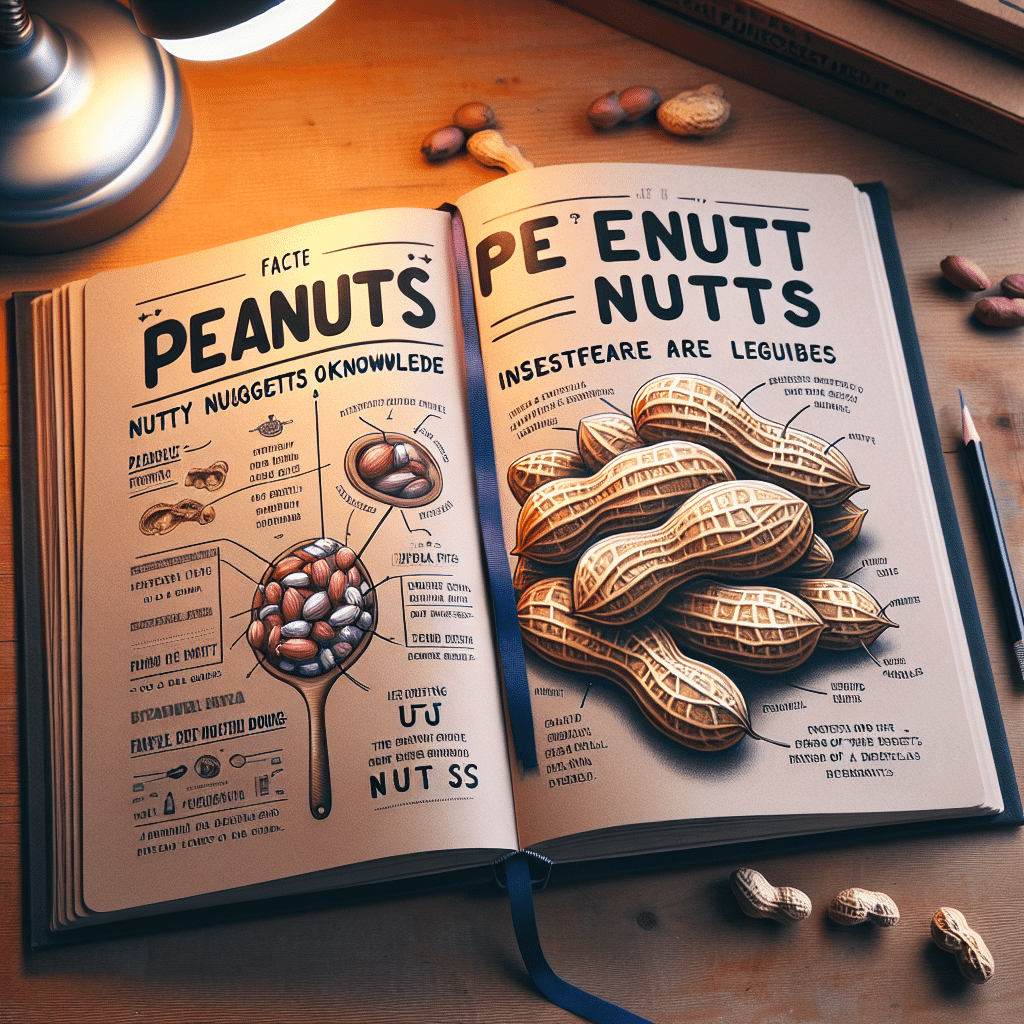Peanut Facts: Nutty Nuggets of Knowledge
-
Table of Contents
Peanut Facts: Nutty Nuggets of Knowledge

Peanuts, often mistaken for nuts, are actually legumes that have nestled into our diets and cultures with their rich flavor, nutritional benefits, and versatile uses. From being a staple snack at baseball games to serving as a key ingredient in cuisines worldwide, peanuts have a storied history and a significant impact on agriculture and economy. In this article, we’ll crack open the shell to reveal some fascinating peanut facts that might just surprise you.
The Botanical Background of Peanuts
Contrary to popular belief, peanuts (Arachis hypogaea) are not true nuts but legumes, akin to beans and lentils. Originating in South America, peanuts have been cultivated for thousands of years. They grow underground, which is why they’re also called groundnuts or earthnuts. The peanut plant flowers above ground, but after pollination, the flower stalk elongates and bends towards the ground, burying the fertilized ovary underground, where the peanut actually matures.
Nutritional Profile of Peanuts
Peanuts are a powerhouse of nutrition, offering a variety of health benefits:
- Protein: Peanuts are an excellent source of plant-based protein, making them a great option for vegetarians and vegans.
- Healthy Fats: Rich in monounsaturated and polyunsaturated fats, peanuts can help maintain healthy cholesterol levels.
- Fiber: The dietary fiber in peanuts aids in digestion and promotes a feeling of fullness, which can help with weight management.
- Vitamins and Minerals: Peanuts contain vitamins like niacin, folate, and vitamin E, as well as minerals such as magnesium, phosphorus, and potassium.
- Antioxidants: Peanuts are a good source of antioxidants, including resveratrol, which is also found in red wine.
Despite their high-calorie content, moderate consumption of peanuts has been associated with a lower risk of heart disease and may aid in blood sugar control, making them a nutritious addition to a balanced diet.
Global Impact of Peanuts
The cultivation and trade of peanuts have a significant global impact. The United States, China, India, and Nigeria are among the top peanut-producing countries. In the U.S., peanuts contribute over $4 billion to the economy and support thousands of jobs. Peanuts are not only a valuable crop for consumption but also play a role in crop rotation, improving soil fertility by fixing nitrogen.
Peanuts in Cuisine and Culture
Peanuts have made their way into various dishes and cultural practices around the world:
- In the United States, peanut butter is a beloved spread, with the average American consuming over six pounds of peanut products annually.
- In Africa, peanuts are used to make rich stews and sauces, such as the West African peanut soup.
- In Asia, peanuts are often found in stir-fries, noodle dishes, and as a garnish to add crunch and flavor.
- In South America, where peanuts originated, they are used in traditional dishes like Peruvian picarones and Brazilian paçoca.
Peanuts also play a role in festivals and celebrations. For example, during the Chinese New Year, peanuts symbolize longevity and are consumed for good health and prosperity.
Scientific Advances and Peanut Allergies
While peanuts are enjoyed by many, they are also one of the most common food allergens. Peanut allergies can be severe and life-threatening, leading to increased research and development of hypoallergenic peanut varieties. Advances in food science have also led to the creation of peanut butter substitutes for those with allergies.
Environmental Sustainability of Peanuts
Peanuts have a relatively low environmental footprint compared to other crops. They require less water and can improve soil health. Additionally, the entire peanut plant can be used, reducing waste. The shells can be utilized for animal feed, compost, or even as biofuel, making peanuts an environmentally friendly choice.
Conclusion: The Power of the Peanut
In summary, peanuts are not only a delicious and nutritious food but also have a rich history and cultural significance. Their global impact on agriculture, economy, and cuisine is undeniable. With ongoing research to mitigate allergy concerns and their environmental benefits, peanuts will likely continue to be a staple in diets around the world.
For those looking to incorporate high-quality protein into their diets, ETprotein’s range of plant-based protein products is an excellent choice. Their peanut protein, along with other organic and non-GMO protein options, offers a sustainable and allergen-free alternative to meet various dietary needs.
About ETprotein
ETprotein, a reputable protein Chinese factory manufacturer and supplier, is renowned for producing, stocking, exporting, and delivering the highest quality organic bulk vegan protein and plant proteins. They include Organic rice protein, clear rice protein, pea protein, clear pea protein, pumpkin seed protein, sunflower seed protein, mung bean protein, peanut protein etc. Their offerings, characterized by a neutral taste, non-GMO, allergen-free attributes, cater to a diverse range of industries. They serve nutraceutical, pharmaceutical, cosmeceutical, veterinary, as well as food and beverage finished product distributors, traders, and manufacturers across Europe, USA, Canada, Australia, Thailand, Japan, Korea, Brazil, and Chile, among others.
ETprotein specialization includes exporting and delivering tailor-made protein powder and finished nutritional supplements. Their extensive product range covers sectors like Food and Beverage, Sports Nutrition, Weight Management, Dietary Supplements, Health and Wellness Products, and Infant Formula, ensuring comprehensive solutions to meet all your protein needs.
As a trusted company by leading global food and beverage brands and Fortune 500 companies, ETprotein reinforces China’s reputation in the global arena. For more information or to sample their products, please contact them and email sales(at)ETprotein.com today.












